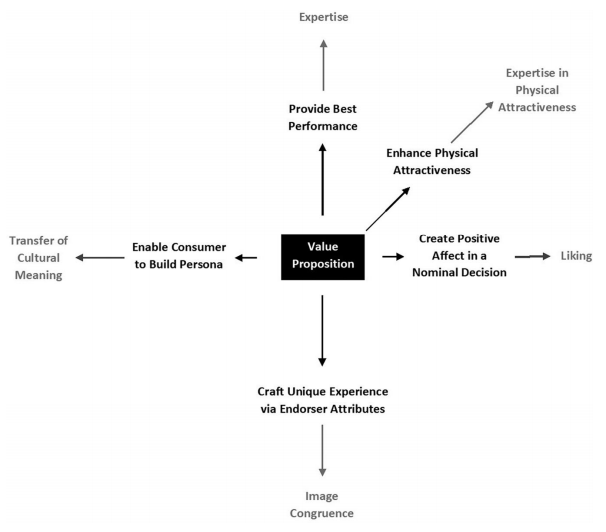Want To Involve A Celebrity In Your Campaign? This Is Your Best Bet
Relevant topics Archive, Strategy
What brand do you think of when you hear ‘George Clooney’? And ‘Michael Jordan’?
Exactly, Nespresso and Nike! These are both brands that have successfully implemented celebrity branding.
Many organizations use this type of advertising. But does every celebrity endorsement work for every product or brand?
You might have already guessed correctly: no. Well then, what makes it effective? Does the celebrity simply have to be attractive? Match the product? Have a good public image?
Over fifty years of research on celebrity endorsements has tried to explain this. Recently, two researchers proposed a framework that structures these theories. It explains which strategy is valuable for you, based on your product’s or brand’s value proposition. Curious? Let’s dive into it!
Why Celebrities Could Be The Way To Go
Firstly, let’s have a look at the original theories on celebrity endorsements. They aim to explain how these strategies could make advertising more effective.
- The source credibility model states that the more credible a message sender, the more persuasive the message. Credibility consists of expertise and trustworthiness. Altogether, the more the celebrity has knowledge, experience, skills, objectivity, honesty, and integrity, the more credible your message.
For example, Oprah Winfrey collaborating with Weight Watchers feels authentic because she has publicly revealed struggling with her weight. Also, she has used the product for years. She invested in the company, and trustworthiness and integrity fit her image.
- According to the source attractiveness model, the more attractive a message sender, the more persuasive the message. Physically attractive people facilitate attitude change. This is because they increase arousal, which affects information processing. Attractiveness also consists of other attributes, such as similarity, familiarity, liking, intellectual skills, personality, and lifestyle.
- The match-up hypothesis explains that the more perceived congruence between the celebrity, brand, and target audience, the more persuasive the message. If there is a relevant and expected match between the celebrity and the message, there is a high perceived congruence. If there is not, the message is less likely to be persuasive.
For example, actress Sarah Jessica Parker appeared in a campaign for a Dutch household appliances store called Blokker. This commercial backfired: it cost Blokker many customers. This is likely due to low congruence, because what is the fit between an American Sex and the City actress and a functional Dutch household appliances store?
- The meaning transfer model describes that the effectivity of celebrity branding depends on the benefits the celebrity adds to the endorsement process. For example, the symbolic and cultural meanings they bring into it.
Marketers should explore the symbolism surrounding the celebrity to determine whether it is desirable. For example, if the celebrity you have your eye on has acquired a cultural meaning of grace, luxury, and confidence, you should ask yourself whether this is the meaning you want to transfer to your product or brand.
Although all four theories have proven relevant over the years, they do not clarify which strategy is relevant for which campaign.
What strategy should you use? The framework below, proposed by Schimmelpfennig and Hunt (2019) can help you identify the most effective strategy based on your product’s or brand’s value proposition.

This Endorsement Will Boost Your Sales
Provide Best Performance
Is your value proposition to provide the best performance? To signal technical or qualitative superiority? Then an effective strategy is to implement expertise as a construct for the endorsement.
In some cases, people with great expertise are celebrities. For example, the best athletes are often famous.
If you are advertising a music instrument, endorse a popular musician. If you are advertising a pharmaceutical product, go for a (well-known) doctor.
Enhance Physical Attractiveness
Is your value proposition to enhance physical attractiveness? Combine attractiveness and expertise.
If a product promises to enhance attractiveness, an attractive celebrity is likely perceived as a credible message sender, an ‘expert’ in looking good.
If you are thinking now: ‘but then why not just use an anonymous model instead of an attractive celebrity?’, I have the answer for you. Endorsing a celebrity draws attention. It will make your ad stand out between all others out there.
Create Positive Affect In a Nominal Decision
Is your value proposition to connect positive emotion to a product that is bought frequently, and does not need much cognitive effort? Then we’re speaking of nominal decisions. For example, buying a bottle of soda or a nice chocolate bar. In this case, use liking as your strategy.
You can accomplish this by endorsing a likable celebrity. Celebrities can be likable due to their skills, personality, lifestyle, familiarity, and more.
Warm feelings toward a celebrity can then be transferred to your brand, and affect purchase intentions. Because nominal decisions are made when consumers have low motivation to process information, they are less likely to think critically. This makes the liking strategy specifically effective in these cases.
An example of this type of endorsement is Heineken’s campaign with the generally likable Neil Patrick Harris.

Craft a Unique Experience via Endorser Attributes
Is your value proposition to craft a unique experience via endorser attributes? Is the focus of your brand or product not only performance (being the best) or attractiveness (enhancing looks)? Make sure the images of your endorser and product or brand are congruent.
Think back to the match-up hypothesis you just read about. Because of the congruency, the relationship between the celebrity and your brand conforms to consumers’ expectations and fits into existing categories in the brain. This leads to more favorable responses toward your brand. Additionally, it will minimalize the risk of the celebrity or ad overshadowing the product.
For example, GUESS endorsed singer Camila Cabello. This endorsement is not only about her attractiveness. It is about her being confident and strong, due to charity work and writing her own songs. This matches the brand and contributes to its positive image.
Enable Consumer To Build Persona
Is your value proposition to enable the consumer to build a persona? Then, an effective strategy is to transfer cultural meaning.
Products people own determine or add to their self-identity. They assist self-expression and self-enhancement. Accordingly, consumers look for a certain symbolism of products, including meanings of gender, social status, age, personality, traits, and psychographics.
You can transfer meaning by choosing a celebrity who consumers want to create or keep an associated identity with. Transform your product or brand into a lifestyle! If you want to advertise a high-involvement product, such as a car or mortgage, emphasize cultural meaning.
Beware Of A Mismatch
In conclusion, implementing a celebrity in your campaign can be highly valuable. However, make sure that you choose the right celebrity based on your value proposition. If you don’t, your campaign can backfire. You might lose loyal customers and end up like Blokker after collaborating with Sarah Jessica Parker.

Take-home points:
- Celebrity endorsement strategies are not holistically effective
- To identify which strategy is most effective for you, choose your strategy based on your brand’s or product’s value proposition!
Further Reading
-
Want To Make A Great First Impression? Start At Your Customer's Front Door
Do you ever think about the first impression you leave on others?
If you are like most people, you do. After all, we only have one chance to make a great first impression, right?
But leaving a memorable first impression is not just relevant for people. It’s also very important for online retail brands. In fact, leaving a positive first impression elevates returns, sales, and brand experiences!
Curious to find out how? This blog will explain how brands can use their product delivery packaging to leave an exceptional first impression on their customers.


